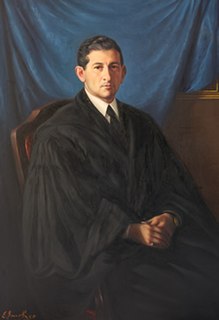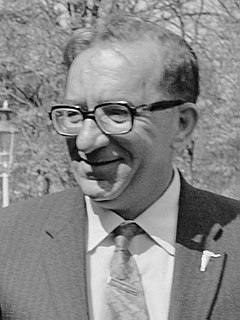
Edoardo "Eddie" Fenech Adami, is a Maltese politician and Nationalist politician who served as Prime Minister of Malta from 1987 until 1996, and again from 1998 until 2004. Subsequently, he was the seventh President of Malta from 2004 to 2009. He led his party to win five general elections, in 1981, 1987, 1992, 1998 and 2003. Staunchly pro-European, Fenech Adami is the longest serving Maltese prime minister since Malta's independence, and was fundamental for Malta's accession to the European Union.

Giorgio Borg Olivier, was a Maltese statesman and leading politician. He twice served as Prime Minister of Malta as the Leader of the Nationalist Party. He was also Leader of the Opposition between 1955–58, and again between 1971–77.

Sir Paul Boffa, OBE was a Maltese prime minister (1947–50) who took office after self-rule was reinstated by the British colonial authority following the end of World War II.

General elections were held in Malta on 26 October 1996. Although the Malta Labour Party received the most votes, the Nationalist Party won the most seats. However, the Labour Party was awarded an additional four seats to ensure they had a majority in Parliament.

General elections were held in Malta on 9 May 1987. Although the Nationalist Party received the most votes, the Malta Labour Party won a majority of seats. However, in accordance with the modifications made to the electoral system following a similar outcome in the 1981 elections, the Nationalist Party was awarded an extra four seats in order to give them a parliamentary majority.

General elections were held in Malta on 12 December 1981.

General elections were held in Malta on 17 and 18 September 1976. The Malta Labour Party remained the largest party, winning 34 of the 65 seats.

General elections were held in Malta between 12 and 14 June 1971. The Malta Labour Party emerged as the largest party, winning 28 of the 55 seats.

General elections were held in Malta on Saturday, 8 March 2008 alongside local elections. The governing Nationalist Party won a narrow victory over the Malta Labour Party.

A referendum on European Union membership was held in Malta on 8 March 2003. A narrow majority voted in favour of joining but the opposition Labour Party rejected the results. The victory of the Nationalist Party in the 2003 general election confirmed the result of the referendum and Malta joined the EU on 1 May 2004.

Early general elections were held in Malta between 5 and 7 May 1951. They came less than a year after the previous elections as a result of disagreements in the coalition government formed by the centre-right Nationalist Party and centre-left Malta Workers Party. Although the Malta Labour Party received the most votes, the Nationalist Party remained the largest party, winning 15 of the 40 seats. Despite their previous disagreements, the Nationalist Party and Workers Party formed a new government.

General elections were held in Malta between 2 and 4 September 1950. Following the Labour Party splitting into the Malta Labour Party and the Malta Workers Party, the Nationalist Party emerged as the largest party, winning 12 of the 40 seats.

Paul Borg Olivier is a Maltese politician, former mayor of the Maltese capital city Valletta and Secretary-General of the Nationalist Party.
Ġużè Ellul Mercer was a Maltese author, journalist and politician. He joined the Labour Party (PL) and he started his parliamentary career in 1924. He was subsequently elected Member of Parliament at the general elections held in 1951 and 1955. In 1955, he was elected Labour Party deputy-leader for parliamentary affairs. He was also appointed Deputy Prime Minister and Minister for Public Works and Reconstruction in 1955, but lost that position after the 1958 election.

General elections were held in Malta on 18 and 19 October 1921. The Maltese Political Union emerged as the largest party, winning 14 of the 32 seats in the Legislative Assembly and four of the seven elected seats in the Senate. Joseph Howard became Prime Minister.

General elections were held in Malta between 7 and 9 August 1927. Although the Nationalist Party received the most votes, the Constitutional Party emerged as the largest party, winning 15 of the 32 seats in the Legislative Assembly. The Nationalist Party remained the largest party in the Senate with four of the seven elected seats.

General elections were held in Malta between 11 and 13 June 1932. The Nationalist Party emerged as the largest party, winning 21 of the 32 seats in the Legislative Assembly and five of the seven elected seats in the Senate.
Giovanni Felice was a Maltese politician. He was appointed as Minister of Justice from 1953 to 1955, as Minister of Industry and Tourism from 1962 to 1966, and as Finance Minister from 1966 to 1971 in the Giorgio Borġ Olivier cabinet.












